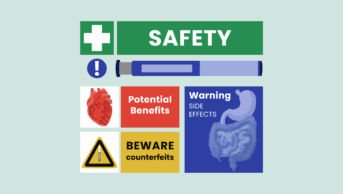
Shutterstock.com
Codeine linctus meets one of the criteria for reclassification to a prescription-only medicine (POM), meeting minutes from the Commission on Human Medicines (CHM) have revealed.
At a CHM meeting, held on 27 October 2022, the group was presented with an assessment of the benefits of codeine linctus in the treatment of dry cough and the risks associated with recreational use to examine its suitability as a non-prescription medicine.
The CHM provides independent expert advice to government ministers on the safety, quality and efficacy of medicines, and promotes the collection and investigation of information relating to adverse reactions for human medicines. It is an advisory non-departmental public body, sponsored by the Department of Health and Social Care.
The meeting minutes say that the CHM commented on the “lack” of clinical evidence of codeine efficacy in acute or subacute cough.
It also discussed the use of codeine linctus as a primary ingredient in the product of an illegal recreational drink, commonly known as “purple drank”, which has been popularised through social media and hip-hop music.
The minutes also noted that codeine can be fatal “at doses between 500mg to 1000mg” and that some music artists had died through overuse and addiction to “purple drank”.
“The Commission is aware of warnings highlighting addiction currently included in product information for codeine medicines; however, also noted the regulatory actions taken in France, Nigeria and Ghana following reports of young adults becoming addicted to codeine oral solutions,” the minutes read.
It was also noted that the Commission was “concerned” by an “increasing number” of reports of diversion of the product and cases of aggression directed towards pharmacists.
Overall, the CHM concluded that, given the evidence that codeine linctus was being incorrectly used, abused, and could lead to addiction and be used for illegal purposes, they were “of the view” that codeine linctus met the second prescription-only criterion as laid out in paragraph 3(b) of the classification of UK marketing authorisation section of the Human Medicine Regulations 2012 (see Box).
Box: Human Medicine Regulations 2012
(3) A UK marketing authorisation must be granted subject to a condition that the product to which the authorisation relates is to be available only on prescription if the licensing authority considers that the product:
(a) is likely to present a direct or indirect danger to human health, even when used correctly, if used without the supervision of a doctor or dentist;
(b) is frequently and to a very wide extent used incorrectly, and as a result is likely to present a direct or indirect danger to human health;
(c) contains substances, or preparations of substances, of which the activity requires, or the side effects require, further investigation; or
(d) is normally prescribed by a doctor or dentist for parenteral administration.
Claire Anderson, president of the Royal Pharmaceutical Society, said she was “aware” of the growing concerns over the inappropriate use of over-the-counter codeine.
“As the experts in medication with a duty to protect the health and wellbeing of the public, every pharmacist will assess the benefits and risks of codeine for every individual, and we would encourage them to have these conversations with their patients,” she said.
“There is evidence to suggest a short-term benefit in the use of OTC codeine, particularly when combined with nonsteroidal anti-inflammatory medicines for the relief of pain. Current evidence, however, shows that there is variation in how individuals respond to codeine.
“There is also research that shows that up to 60% of people are genetically predisposed to opioid dependence, which is why care must be taken with prescribing or supply.”
Anderson said that community pharmacists were “well placed” to offer meaningful intervention and support for people considering using codeine and other opioid medicines, or who are already using these products, to ensure those who will benefit can still access these products.
“Managing access to OTC codeine can be challenging. Community pharmacists would not always be aware if patients had already accessed codeine medicines from another pharmacy or from an online pharmacy. Therefore, we think it’s vital that pharmacists directly involved in patient care should, with patient consent, have full read and write access to the patient health record in the interest of high quality, safe and effective patient care.”
2 comments
You must be logged in to post a comment.



As a pharmacist I always have conversations with patients purchasing otc pain relief products containing codeine. Unfortunately, I could refuse to sell the product, but another pharmacy can still sell the product to the patient. There is no viable solution but to reclassify these products
I think it’s a good idea for us all to consider reclassification as the abuse is worrying